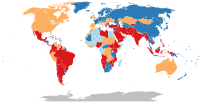
Photo from wikipedia
(1) Background: The COVID-19 pandemic posed a great challenge to health care systems worldwide. Health care personnel, including nurses, work under high pressure and are overworked and overwhelmed, which results… Click to show full abstract
(1) Background: The COVID-19 pandemic posed a great challenge to health care systems worldwide. Health care personnel, including nurses, work under high pressure and are overworked and overwhelmed, which results in a higher prevalence of burnout and workplace bullying, which further increases the intention to leave the nursing profession. (2) Methods: A comparative correlational and cross-sectional study design was adopted, and an online questionnaire was used to collect data between October 2019 and October 2021. Two hundred and fifty-seven newly graduated nurses participated in this study. The studied variable was measured using the Oldenburg Burnout Inventory, the Negative Acts Questionnaire, and metrics developed by the authors. (3) Results: The prevalence of bullying and burnout is significantly higher among nurses who worked during the COVID-19 pandemic than among those who worked before the pandemic, but the pandemic has not had an impact on the level of the subjective assessment of bullying. Working as a newly graduated nurse before or during the COVID-19 pandemic is a moderator between person-related bullying and its dimensions and disengagement. (4) Conclusions: Pandemics increase bullying and burnout among newly graduated nurses; however, the current challenges have caused some of this to remain unrevealed, the repercussions of which will appear with double strength later.
Journal Title: International Journal of Environmental Research and Public Health
Year Published: 2022
Link to full text (if available)
Share on Social Media: Sign Up to like & get
recommendations!